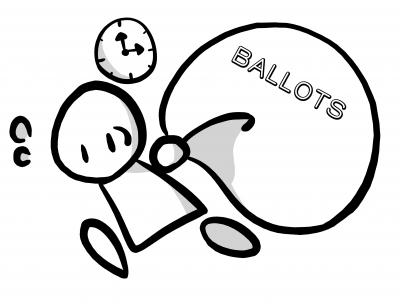It’ll be difficult to make Americans accept the result of the presidential election this year, regardless of what that result may be. News outlets have been urging the country to remain calm and patient in the face of uncertainty.
As we await Election Day results to be finalized, the country is anticipating America’s reaction to the winner. Shopping centers in major metropolitan areas have their windows boarded. Students at George Washington University, seated in the nation’s capital, were advised to stockpile food and medication in preparation for civil unrest.
The United States may have seen an anticlimactic election night Tuesday — mostly due to inconclusive results — but what will America look like in the coming days and even weeks?

Though the wait is frustrating, it’s never productive to rush into a panic. We can have some faith in our democratic procedures, even if they take longer than we are comfortable with.
However, President Donald Trump had already claimed victory early Wednesday morning long before final votes were tallied, and has continually voiced concerns over the legitimacy of mail-in ballots in general.
We can definitely expect debate over the validity of election results, even more so than we are seeing now. For both parties, it’s difficult to accept loss in such a high-stakes contest. However, certain aspects of the public’s response will differ based on which candidate ultimately wins.
A victory for former Vice President Joe Biden will see backlash from not just conservatives, but liberals as well. The Democratic Party is far more divided than its counterpart, and leftists have been vocal about their disapproval of a Biden presidency since before he became the Democratic nominee.
Progressives want immediate change, and have been dissatisfied with the current system of democracy. So their protest is not only against Biden, but the whole establishment that gave him the platform capable of boosting him to the Oval Office.
If Biden does win, we can assume Trumpists will also express their anger. Liberals and Trumpists will both protest a common enemy: Biden. But their intentions will differ greatly, and so will their forms of protest.
Since the nationwide waves of unrest began this summer after George Floyd’s death, Americans remained angry. Tensions haven’t felt this high in a long time.
This year saw a record number of gun sales — nearly 17 million as of Election Day — in the United States, and many went to first-time owners. While many factors play into Americans’ desire to buy guns, it’s still concerning to know so many firearms are at the ready in this country during such polarized times. Things could get violent, even more so than they did this summer.
If the left wants to keep tensions low, they should continue to suppress looting at all costs during demonstrations. Looters are often not participants of the actual movement, but when they join the crowd on the streets, it’s easy to associate them with protesters as a whole.
Trump has largely based his platform on fear-mongering, specifically about antifa and other groups he calls out as trying to tear down democracy. Any instances of looting, which doesn’t help advance a social movement, only gives him more to found his claims on.
But if we are trying to predict the potential response of Trump supporters — whether it be to a win or a loss — we have to look at their track record. Far-right groups have a long list of hate crimes to their name.
Conservative activists are more trained and organized, two traits the left fails to adopt. And though the majority of Trump supporters are not members of white supremacist groups such as the Ku Klux Klan or the Proud Boys, they still tend to harbor a collective mindset that often supports similarly hateful ideologies.
Kyle Rittenhouse killed two people during a Wisconsin protest following the shooting of Jacob Blake, yet he received a flood of support from conservatives, including Trump, who rushed to defend his actions.
And further, far-right group the Wolverine Watchmen hatched a plan in recent months to kidnap Michigan Gov. Gretchen Whitmer, and had even threatened to launch a civil war.
These extremists are more willing to take outlandish action when they know they’re going to be backed by similar-minded supporters.
If Trump wins, his opponents will of course feel distress. But the same stands for either party: if the win is legitimate, there’s only so much a candidate can do to try and contest the results.
However, could Trump’s re-election be the final straw that sparks a civil war? While the last thing we want is to relive our past this way, it seems almost imminent.
Regardless of who clinches the presidency in 2020, it will take our nation a very long time to heal from the extreme polarization that has shot to the forefront of all discussion over the past four years. Things may die down, and we might eventually return to a more conventional presidency, but the cracks in our country may never quite mend.
















































































































